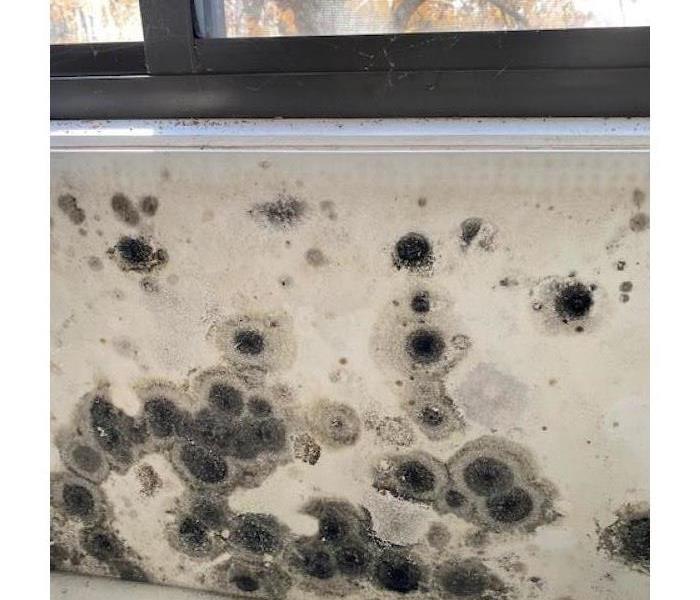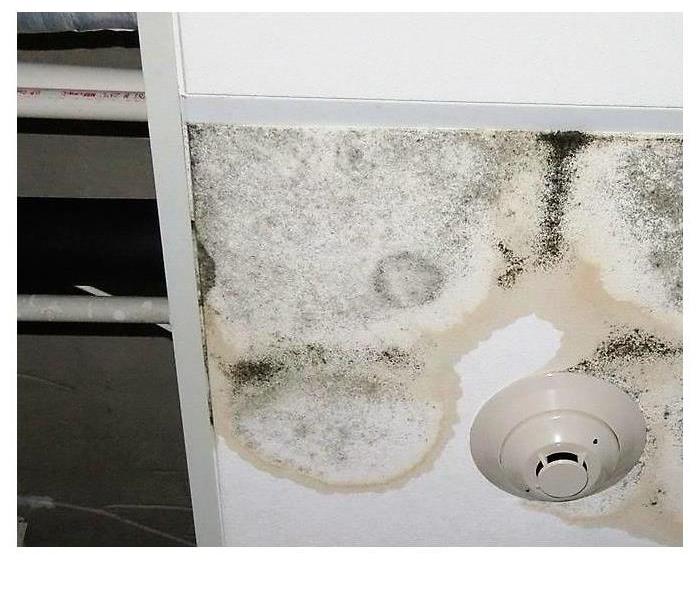Archived Mold Remediation Blog Posts
Clearing the Air: SERVPRO®'s Expert Mold Remediation Services
5/20/2024 (Permalink)
Mold – it's a homeowner's worst nightmare. From its unsightly appearance to its potential health hazards, mold can wreak havoc on properties and peace of mind. But fear not, because SERVPRO® is here to tackle mold head-on with our expert mold remediation services. In this blog post, we'll delve into how SERVPRO's comprehensive approach to mold remediation restores homes and brings peace of mind to homeowners.
Assessment and Containment:
The first step in SERVPRO's mold remediation process is a thorough assessment of the affected area. Our trained technicians use advanced techniques and equipment to identify mold growth, determine the extent of the contamination, and develop a customized remediation plan. We then implement containment measures to prevent the spread of mold spores to unaffected areas, ensuring a targeted and effective remediation process.
Safe and Effective Removal:
With containment measures in place, SERVPRO gets to work on safely removing mold from the affected area. Our technicians utilize specialized equipment and techniques to remove mold colonies and spores from surfaces and the air. Whether it's scrubbing, sanding, or HEPA vacuuming, we leave no stone unturned in our quest to eradicate mold and restore indoor air quality.
Thorough Cleaning and Sanitization:
Once the mold has been removed, SERVPRO focuses on cleaning and sanitizing the affected area to prevent future mold growth. We use antimicrobial treatments to inhibit the growth of mold and mildew, ensuring a clean and healthy environment for homeowners and their families.
Restoration and Prevention:
Finally, SERVPRO focuses on restoring the affected area to its pre-mold condition. From repairing damaged materials to improving ventilation and moisture control, we take proactive measures to prevent future mold problems. Our goal is not just to remediate mold, but also to provide long-lasting solutions that give homeowners peace of mind.
Support and Reassurance:
Throughout the mold remediation process, SERVPRO provides more than just technical expertise – we offer support and reassurance to homeowners facing mold problems. We understand the stress and uncertainty that come with mold issues, and we're here to guide homeowners through every step of the remediation journey.
When it comes to mold remediation, SERVPRO is the name homeowners can trust. With our comprehensive approach, advanced techniques, and unwavering commitment to customer satisfaction, we tackle mold problems head-on and restore homes to their former glory. If you're facing mold issues, don't hesitate to reach out to SERVPRO for prompt and professional assistance. Together, we'll clear the air and restore peace of mind to your home.
What do Mold Remediation Companies Do?
8/28/2023 (Permalink)
If you’ve discovered mold growing in your home, you know that the first step that you should take is to contact a mold remediation company and have an inspection of your property.
You may call a number of companies to your home (we hope we are one of them!) to give you their professional opinion of your situation. When choosing a mold remediation company, there are several key factors that we recommend you consider.
Whoever you choose to work in your home should be able to explain the remediation process to you in layman’s terms.
We know that we have been educated in mold and it’s removal from homes but do not expect that our customers have been! Mold remediation does require training and equipment but the process can be explained easily to our customers. If a company uses only technical terms and the process seems overly complicated, take them off your list!
Look for signs that your mold remediation specialist uses safety precautions.
Proper safety gear should be worn when dealing with mold. Are their technicians using personal safety equipment such as high quality, high filtration face mask and gloves? If they aren't safe about their own health, you shouldn't trust that they will be about yours!
Ask your prospective mold remediation company the following questions:
Will your chosen company use containment materials to seal off the work area so that mold spores do not become dispersed throughout the home?
What kind of equipment does the company use? Mold professionals use HEPA air scrubbers and vacuums, commercial-strength dehumidifiers and proprietary cleaners.
Will the company be using an air scrubbers and an air exchange through ventilation to remove the airborne mold spores after the mold is physically removed?
Will moldy porous building materials such as drywall, insulation and baseboards be removed and discarded? These materials are relatively inexpensive to replace and difficult to impossible to restore to their previous uncontaminated condition.
What antimicrobial chemicals will be used to clean any remaining mold and mold stains after the demolition has been completed?
Will the area be treated with a sealer or encapsulant to make the treated areas more resistant to water damage and mold?
How much experience and training does the company have in mold remediation and are they certified by the IICRC? A company that has been in the business for at least 10 years will be prepared for any situation and will know how to best handle your job.
Does the company have experience and training cleaning HVAC ductwork in structures that have had a mold infestation?
SERVPRO of Newtown and Southern Litchfield County will answer yes to all of these questions.
We are the areas number one mold remediation company for a reason. If you have mold in your home, give us a call for a straightforward discussion about how we can help!
Under Carpets, On Ceiling Tiles, In Your HVAC System: The Surprising Places That Mold Grows
2/11/2020 (Permalink)
Mold spores naturally exist in all interior and exterior environments and at normal levels, are not harmful. Given the opportunity, however, mold spores can grow quickly and reach dangerously high levels. Most people are aware of the health concerns that are associated with mold in the home and know to keep an eye out for mold growth in their showers and basements. There are some surprising places that mold can grow in the home and business where it's appearance isn't quite as apparent.
- Ceiling tiles – Many businesses choose to have dropped ceiling tiles installed due to the ease of access to the plumbing, fixtures and ductwork above them. In residential homes, ceiling tiles are often found in a finished basement. The lack of light and moisture from pipes and ducts, along with the obscurity of being hidden behind the ceiling, makes the space above your dropped ceiling ideal for mold growth. If you notice staining on your ceiling tiles, take them out and investigate the source of water. Once the leak has been repaired, replace any affected tiles.
- Under your area rugs and floor mats – Most homes and businesses have mats at the front entrance so that those entering can wipe their feet. But the rain, snow and mud that is shaken off boots saturates the rugs, creating a breeding ground for mold. Be sure to pick lift rugs, clean them and allow them to dry out on a regular basis to deter mold from growing.
- Behind the kitchen sink – We do several mold remediation jobs each year in which mold was discovered behind (or under) a kitchen sink. The culprit is typically a slow leaking pipe that goes unnoticed because of its location. The water damage is eventually discovered – sometimes because the cabinetry is rotting, other times due to kitchen renovation – and substantial mold growth along with it. If you notice any signs of leaking water under your sink such as discoloration of the cabinets or lifting of the flooring around the sink, call a plumber in to determine and repair the cause.
- HVAC system – Mold grows in ductwork because of the condensation that can build up due to the moist air blowing through them. HVAC ducts also collect organic material such as dust, pollen, animal fur and dead skin cells. This material happens to be an excellent source of food for mold spores. Typically, a musty odor is the first sign people notice that there may be mold in their ducts. Having your HVAC system cleaned annually will reduce the risk of mold growth by removing these particles.
- Your attic – Moisture in your attic can cause mold to grow. This can occur for a variety of reasons, the most obvious being a small, undetected roof leak. However, mold growth is also caused when an attic has inadequate or improperly installed venting. Additionally, air leaks in the attic allow warm, moist air to enter the space as well. Air leaks can be caused by a variety of reasons- the space around the chimney, the furnace vent and even cable and electrical lines entering the home.
The SERVPRO of Newtown and Southern Litchfield County team specializes in mold damage remediation. Our mold specialists have over 30 years of experience identifying and treating homes and businesses that have mold infestations in the Bethel, CT area. If you see or smell signs of mold or a water leak in your home, call us at (203) 743-5362 to schedule professional mold inspection.
What to Look for When Hiring a Mold Remediation Company
10/7/2019 (Permalink)
 Ask prospective mold remediation companies if they will use safety equipment and protective clothing while in your home.
Ask prospective mold remediation companies if they will use safety equipment and protective clothing while in your home.
If you’ve discovered mold growing in your home, you know that the first step that you should take is to contact a mold remediation company and have an inspection of your property.
You may call a number of companies to your home (we hope we are one of them!) to give you their professional opinion of your situation. When choosing a mold remediation company, there are several key factors that we recommend you consider.
Whoever you choose to work in your home should be able to explain the remediation process to you in layman’s terms.
We know that we have been educated in mold and it’s removal from homes but do not expect that our customers have been! Mold remediation does require training and equipment but the process can be explained easily to our customers. If a company uses only technical terms and the process seems overly complicated, take them off your list!
Look for signs that your mold remediation specialist uses safety precautions.
Proper safety gear should be worn when dealing with mold. Are their technicians using personal safety equipment such as high quality, high filtration face mask and gloves? If they aren't safe about their own health, you shouldn't trust that they will be about yours!
Ask your prospective mold remediation company the following questions:
Will your chosen company use containment materials to seal off the work area so that mold spores do not become dispersed throughout the home?
What kind of equipment does the company use? Mold professionals use HEPA air scrubbers and vacuums, commercial-strength dehumidifiers and proprietary cleaners.
Will the company be using an air scrubbers and an air exchange through ventilation to remove the airborne mold spores after the mold is physically removed?
Will moldy porous building materials such as drywall, insulation and baseboards be removed and discarded? These materials are relatively inexpensive to replace and difficult to impossible to restore to their previous uncontaminated condition.
What antimicrobial chemicals will be used to clean any remaining mold and mold stains after the demolition has been completed?
Will the area be treated with a sealer or encapsulant to make the treated areas more resistant to water damage and mold?
How much experience and training does the company have in mold remediation and are they certified by the IICRC? A company that has been in the business for at least 10 years will be prepared for any situation and will know how to best handle your job.
Does the company have experience and training cleaning HVAC ductwork in structures that have had a mold infestation?
SERVPRO of Newtown and Southern Litchfield County will answer yes to all of these questions.
We are the areas number one mold remediation company for a reason. If you have mold in your home, give us a call for a straightforward discussion about how we can help!
The Mold Remediation Process Shouldn't be a Nightmare!
6/25/2019 (Permalink)
Because of the horror stories that you might see on the news regarding mold infestations, you may feel a bit overwhelmed at the discovery of mold in your home.
The reality is that in most cases, mold remediation is a relatively straightforward process.
The first step in the mold remediation process is to locate the source of the mold. Whether it’s a leaking toilet or insufficient attic vent, the cause of the mold must be corrected first. Any damaged materials such as flooring, drywall or baseboards will be removed and disposed of as well.
An important aspect of our mold remediation work is containing the mold spores. To do this, we create a quarantined area in the mold affected space using plastic containment barriers. The contained area can vary in size depending on the level of infestation. When setting up containment in a building with mold, we first turn off the heating and cooling systems to stop the flow of air throughout the structure.
In addition to the plastic containment we install between rooms and in doorways, our technicians also might create a negative air chamber to contain the mold spores within the barriers.
Specialized air filtration equipment such as HEPA vacuums and air scrubbers are utilized to capture and filter the mold spores from the air.
Anti-fungal and antimicrobial treatments are applied to ensure that the problem does not recur.
Repairs to the damaged areas of your home is done by our Building Services team.
To complete the work, all of the surfaces are sanitized and mold spore counts are taken to ensure that the air is now at a safe level.
We know that for you, mold can be a terrifying discovery. Having a professional, local team take care of the problem will take the worry out of the mold remediation process.
Can Mold Grow Inside Your Home's Ventilation System?
5/13/2019 (Permalink)
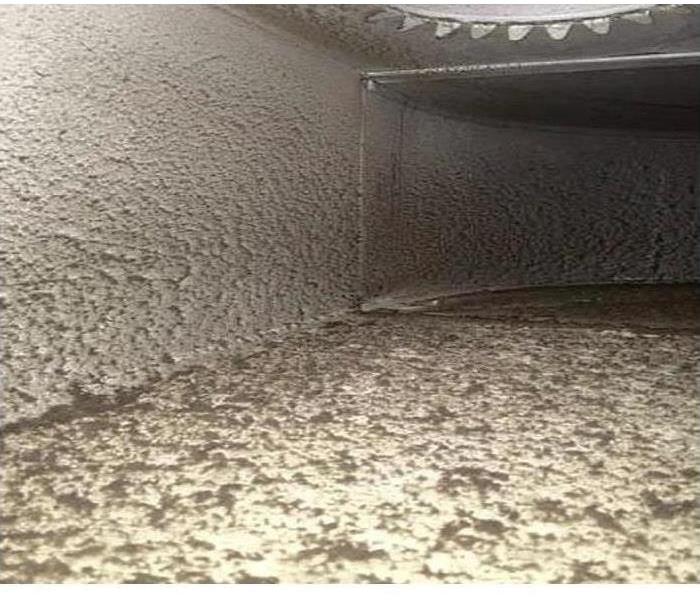 Mold can grow in your home's HVAC system, causing it to be spread throughout the air in your home.
Mold can grow in your home's HVAC system, causing it to be spread throughout the air in your home.
Did you know that mold can grow in the air vents of your home?
When your air conditioning is running and cool air flows through your duct work on hot days, the moisture in the air can condense inside the vent. Because there is moisture present, mold can begin to grow inside the vent.
Mold spores are naturally present and are found everywhere, both indoors and outdoors, most often in an airborne state. Mold becomes a health issue when there are unnaturally high levels of spores in a building.
Spores can enter your duct work by simply blowing in from another area of the home or from the outside. Because warm, moist environments are ideal for growth, the conditions inside of the duct work are ideal for mold to spread. The dust and animal hair typically present in air ducts act as a food source for the mold.
How do I know if there is mold in my HVAC system?
When mold is present, it can cause illness to those living in the home. If your family members are having unexplained health symptoms and you haven’t found any physical signs of mold, it’s possible that it’s living hidden in your ductwork and the spores are being forcibly blasted throughout your home.
The SERVPRO of Newtown and Southern Litchfield Team has over 30 years of mold remediation training and experience.
If you are concerned that you have mold in your HVAC system, call our office at (203) 743-5362 to schedule an inspection and a cleaning.
Yes, Mold Does Grow in Fairfield County Homes During the Winter.
2/14/2019 (Permalink)
 Mold can begin to grow in just 24 hours after a frozen pipe bursts.
Mold can begin to grow in just 24 hours after a frozen pipe bursts.
Did you know that mold can grow in your home year-round?
In fact, because Bethel, CT area homes are prone to water damage in the winter due to burst pipes, ice dams and flooding, mold can be a big problem to area homes.
When moisture gets into the walls of your home, mold can start growing unnoticed until it has become widespread. The situation is often compounded by the use of humidifiers during the winter to combat the dry air produced by heating our homes. Humidifiers add moisture to the home that can at times become excessive, which also leads to old growth. Although mold thrives in warm environments, it can easily survive inside of Connecticut homes throughout the winter.
To reduce your risk of mold growth in the winter, it is imperative that any water damage to your home is professionally mitigated.
The extent of water damage is not always visible, especially in the case of ice dams, where the water might be hidden behind your walls and in your attic space. Please call our office at (203) 743-5362 for a consultation if you suspect that you have mold in your home.
Mold Growth Found in Vacant Brookfield Area Homes After Storm Causes Water Damage
12/3/2018 (Permalink)
 When water damaged is left unchecked, mold can quickly spread throughout a a vacant home.
When water damaged is left unchecked, mold can quickly spread throughout a a vacant home.
It has been 6 months since tornadoes and microbursts damaged hundreds of houses in the Brookfield area.
Storms of that magnitude are an unusual event in Connecticut and most of us were surprised by the level of damage. Many homeowners were forced to leave their homes that had been damaged by water and fallen trees.
Unfortunately, the damage from the storm is still affecting homeowners. Our office has recently been receiving an influx of phone calls from residents who are discovering mold growth in their vacant homes.
It doesn’t take much for mold to grow and with the amount of water present in many of these storm damaged houses, mold is quickly spreading.
The crew of SERVPRO of Newtown and Southern holds certifications in the IICRC Applied Microbial Remediation Technician and Mold Removal Specialists and are the area's experienced professionals in mold remediation.
We use various containment procedures, including advanced containment procedures like negative air chambers to prevent the spread of mold. Our specialized filtration equipment, such as air scrubbers and HEPA vacuums, allows our technicians to capture microscopic mold spores out of the air.
We’ll use antifungal and antimicrobial treatments to eliminate mold colonies and to help prevent new colonies from forming. It may be necessary to remove and dispose of mold-infested porous materials, like drywall and carpeting, to remediate heavy mold growth.
We clean your furniture, decorative items, curtains, clothing, and other restorable items affected by mold. We use a variety of cleaning techniques to clean and disinfect your belongings. We’re also trained to remove odors and deodorization using fogging equipment.
When the mold levels have been reduced to be normal levels, our building services team will rebuild any areas of your home that require it, leaving your home better than ever.
If you see signs of mold growing on your walls, ceilings or floors, call us at (203)743-5362 to schedule an inspection.
Tips to Reduce the Risk of Black Mold in Your Newtown Home
10/25/2018 (Permalink)
 Opting for hard flooring such as tile or laminate flooring in your basement will reduce your risk of mold growth.
Opting for hard flooring such as tile or laminate flooring in your basement will reduce your risk of mold growth.
Mold is everywhere in our environment.
It occurs naturally and at normal levels, it is not harmful in your home. However, if there are conditions in your home that are causing abnormal levels of mold spores to be present, professional remediation may be necessary. Sometimes, mold is hidden behind walls, in attics and under carpeting, making it hard to identify. There are some preventative steps that can be taken to reduce the risk of toxic mold in your New Milford home.
- Run air conditioners during the summer and dehumidifiers year round to lower the humidity in the air- under 50% is ideal.
- Have an exhaust fan installed in bathrooms with showers
- Regularly check under your bathroom and kitchen sinks for pipes that might be leaking under your cabinets. This is a major cause of the mold jobs we receive. A slow drip over years can cause a big mold problem.
- Opt for hard flooring in basements and bathrooms rather than carpeting, which are an ideal breeding ground for mold due to moisture and condensation.
- Check your attic for signs of mold- make sure that your attic vents are not blocked and functioning properly.
- Take preventative measures to avoid ice dams, which can result in mold growth behind walls and ceilings in a home.
- Repair any leaks immediately and thoroughly clean up any water from the leak.
- Make sure your gutters are properly functioning and that they are not blocked with leaves. This will help reduce the water flowing towards your house and possibly into your basement.
- Similarly, making sure that the landscaping around your house slopes away will reduce the amount of water entering your foundation.
- If you have an old Connecticut home with a crawlspace, there are vapor barriers that can be installed to stop mold spores from entering through those wood floor gaps.
If you suspect you have mold in your home, whether it's because you notice a musty smell, have unexplained illness or see a black substance on your walls, call us at (203) 743-5362 to schedule an inspection with one of our IICRC mold specialists.
Does Your Homeowner's Insurance Policy Cover Mold Growth?
9/24/2018 (Permalink)
 If there is a leak under your kitchen sink that you fail to repair in a timely manner, mold may not be covered by your homeowner's insurance policy.
If there is a leak under your kitchen sink that you fail to repair in a timely manner, mold may not be covered by your homeowner's insurance policy.
We are called to New Milford area homes on a weekly basis to inspect mold. With all of the attention on black mold and it's potential to be toxic to the health, many homeowner's don't want to take a chance when they spot mold. Luckily, not every home that we inspect requires professional remediation from the SERVPRO of Newtown and Southern Litchfield County team. There are times where the mold found can be cleaned up safely by the homeowner themselves (such as when isolated on a hard, non porous surface such as bathroom tile).
However, there are also the cases in which there is a mold infestation in the home that requires our services. It can be surprising to some homeowners to discover that their insurance policy does not cover mold.
Typically, mold remediation will be covered if it is caused by water damage that has been properly addressed. For example, if a pipe bursts in your basement and you call in a water damage restoration team to clean up the water quickly, you should be covered if mold grows as a result of the humidity in the air.
However, if you have a leaky pipe under your kitchen sink that you ignore for months and that results in mold growth that requires professional remediation, you most likely will not be covered. Your insurance company will consider the mold growth a result of your failure to maintain the property.
Call your insurance agent if the language of the policy is confusing and you are unsure. Some policies contain clauses that exclude mold. Some will cover mold removal only under certain circumstances. Typically, if your policy does not include mold remediation it can be added onto the policy. It's a smart preventative measure that can save you thousands in the future. The best prevention that a homeowner can take, however, is to be vigilant about water leaks in their home and repair them as soon as they are discovered.
If you see signs of mold in your Fairfield County home, call SERVPRO of Newtown and Southern Litchfield County at (203) 743-5362. Our mold technicians will come out and give you an honest assessment of the situation.
Common Causes of Mold and Tips to Avoiding it in Your Newtown Home
9/17/2018 (Permalink)
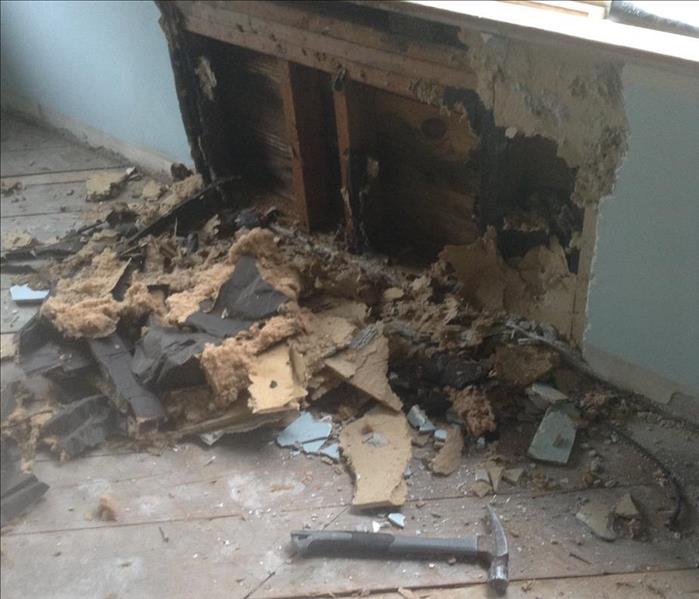 Because they are often damp and dark, basements tend to be an ideal location for mold growth.
Because they are often damp and dark, basements tend to be an ideal location for mold growth.
There has been a lot of press on mold in homes and the potential health hazards of black mold lately. At SERVPRO of Newtown & Southern Litchfield County, we talk with many homeowners who are concerned when they discover mold in their home.
In order to grow, mold requires certain conditions to be met. Mold spores need to be present and have a food source (examples would be cotton, sheetrock, plywood, etc.). In addition, mold requires darkness, oxygen and warm temperatures. However, these are typical conditions in most homes. The factor that most determines whether mold will grow in your home is moisture.
Some of the most common causes of residential mold damage are:
1. Leaky Pipes - A slow leak might not be obvious to a homeowner but over time can create an environment that is ideal for mold growth. We have responded to a number of jobs in Fairfield County in which a plumber has discovered mold behind the kitchen cabinets due to a leaking pipe. In these cases, the kitchen cabinetry as well as walls and flooring often requires removal.
The fix: Periodically check pipes, walls and cabinetry for any signs of leaking.
2. Attic Mold – In order to keep moisture levels low in an attic, it must be ventilated properly. A well-ventilated attic will allow warm air to escape through the peak of the roof via the ridge and soffit vents. Another reason for moisture in an attic can be a roof leak.
The fix: Have your ridge and soffit vents checked for blockages and inspect your roof and attic for leaks.
3. Basement Mold – Due to low sunlight, condensation, high humidity, flooding and leaks, the basement is a common location for mold growth. In addition, people spend little time in their basement and are less likely to spot it early on.
The fix: If there is flooding, have your basement waterproofed. Keep humidity levels down with a dehumidifier. Repair any leaky pipes. If there is water at your house's foundation, it may be necessary for ditches and drains to be built to protect your New Fairfield home.
The good news is, not all mold requires professional remediation. If you spot mold in your Bethel home, give us a call at (203) 743-5362. Our mold specialists have over 20 years of experience inspecting mold and will give you an honest assessment of whether mold remediation is required.
The Facts About Mold in New Milford, CT Homes
8/1/2018 (Permalink)
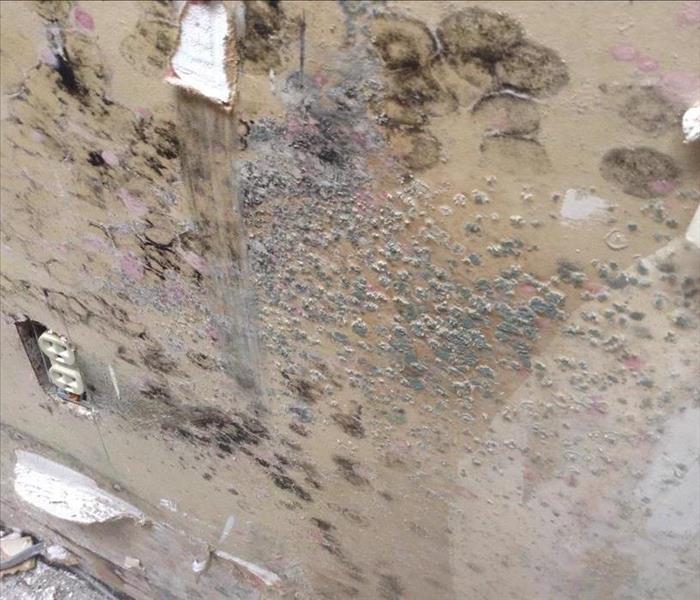 Not only is "black mold" toxic - all shades of mold -gray, black, purple, yellow, white- can be harmful to your health.
Not only is "black mold" toxic - all shades of mold -gray, black, purple, yellow, white- can be harmful to your health.
An internet search on household mold will result in a plethora of conflicting information on what mold is and how it can be removed from a home. There are some facts about mold that are indisputable and good to know in case you find mold in your Newtown home.
1. Bleach does not kill mold
This myth is so prevalent that we've been advised to use bleach against mold from everyone including our neighbors, plumber and numerous google sites. While mold can be killed by bleach on hard surfaces such as bathroom tile, it does not kill mold on porous surfaces such as walls and wood. Mold spores present in the air are not affected by topical bleach use. What’s more, because it is made up of 90% water, removing mold with bleach can actually make mold regrow even faster.
2. Mold can start to grow in 24 to 48 hours
If there has been water damage in your home or business, mold can begin to grow in as little as 24-48 hours. We typically see this when a home has been vacant while the owners are away on vacation. We've even responded to jobs in which the water damage was in a basement and not discovered until the following day. To avoid mold growing after a water damage, do not delay in calling a water damage remediation company after a flood.
3. There are over 100,000 different types of mold
The term usually used when referring to dangerous mold is "black mold" however mold can come in a variety of colors, including brown, green, yellow and white. In fact, there are over 100,000 known species of mold, most of which exist outside the home. Some molds are helpful to the environment and others are harmful. The most common form of molds found in homes are Cladosporium, Aspergillus, Penicillium, Stachybotrys and Alternaria.
4. Mold is naturally everywhere
Mold exists everywhere, both indoors and outdoors. Mold helps decompose organic matter and plays a vital role in maintaining a balance in our environment. Healthy levels of mold are not harmful to your home or your health. When you see mold growing on surfaces of your home, however, it is probable that conditions exist that are causing an accelerated rate of growth. Typically, this is due to high moisture levels in the home.
When SERVPRO of Newtown and Southern Litchfield County performs mold remediation in a structure, our goal is to bring the level of mold spores to healthy levels. In fact, complete mold spore removal is not possible and if a restoration company claims that they will eradicate mold in your home, you might consider hiring a different company. Look for a business who has an IICRC certification to ensure that your mold restoration company is educated and equipped in identifying and treating household mold.
Surprising Places That Black Mold Grows in Homes and Businesses
3/15/2018 (Permalink)
 Mold was found behind the kitchen cabinets in this Danbury, CT home. The cause of the water and mold was a leaky pipe that had gone undetected.
Mold was found behind the kitchen cabinets in this Danbury, CT home. The cause of the water and mold was a leaky pipe that had gone undetected.
Mold spores naturally exist in all interior and exterior environments and at normal levels, are not harmful. Given the opportunity, however, mold spores can grow quickly and reach dangerously high levels. Most people are aware of the health concerns that are associated with mold in the home and know to keep an eye out for mold growth in their showers and basements. There are some surprising places that mold can grow in the home and business where it's appearance isn't quite as apparent.
- Ceiling tiles – Many businesses choose to have dropped ceiling tiles installed due to the ease of access to the plumbing, fixtures and ductwork above them. In residential homes, ceiling tiles are often found in a finished basement. The lack of light and moisture from pipes and ducts, along with the obscurity of being hidden behind the ceiling, makes the space above your dropped ceiling ideal for mold growth. If you notice staining on your ceiling tiles, take them out and investigate the source of water. Once the leak has been repaired, replace any affected tiles.
- Under your area rugs and floor mats – Most homes and businesses have mats at the front entrance so that those entering can wipe their feet. But the rain, snow and mud that is shaken off boots saturates the rugs, creating a breeding ground for mold. Be sure to pick lift rugs, clean them and allow them to dry out on a regular basis to deter mold from growing.
- Behind the kitchen sink – We do several mold remediation jobs each year in which mold was discovered behind (or under) a kitchen sink. The culprit is typically a slow leaking pipe that goes unnoticed because of its location. The water damage is eventually discovered – sometimes because the cabinetry is rotting, other times due to kitchen renovation – and substantial mold growth along with it. If you notice any signs of leaking water under your sink such as discoloration of the cabinets or lifting of the flooring around the sink, call a plumber in to determine and repair the cause.
- HVAC system – Mold grows in ductwork because of the condensation that can build up due to the moist air blowing through them. HVAC ducts also collect organic material such as dust, pollen, animal fur and dead skin cells. This material happens to be an excellent source of food for mold spores. Typically, a musty odor is the first sign people notice that there may be mold in their ducts. Having your HVAC system cleaned annually will reduce the risk of mold growth by removing these particles.
- Your attic – Moisture in your attic can cause mold to grow. This can occur for a variety of reasons, the most obvious being a small, undetected roof leak. However, mold growth is also caused when an attic has inadequate or improperly installed venting. Additionally, air leaks in the attic allow warm, moist air to enter the space as well. Air leaks can be caused by a variety of reasons- the space around the chimney, the furnace vent and even cable and electrical lines entering the home.
The SERVPRO of Newtown and Southern Litchfield County team specializes in mold damage remediation. Our mold specialist, Ted White, has over 30 years of experience identifying and treating homes and businesses that have mold infestations in the Bethel, CT area. If you see or smell signs of mold or a water leak in your home, call us at (203) 743-5362 to schedule professional mold inspection.
Wet winter weather can cause mold growth to homes and businesses in the New Milford, CT area
1/29/2018 (Permalink)
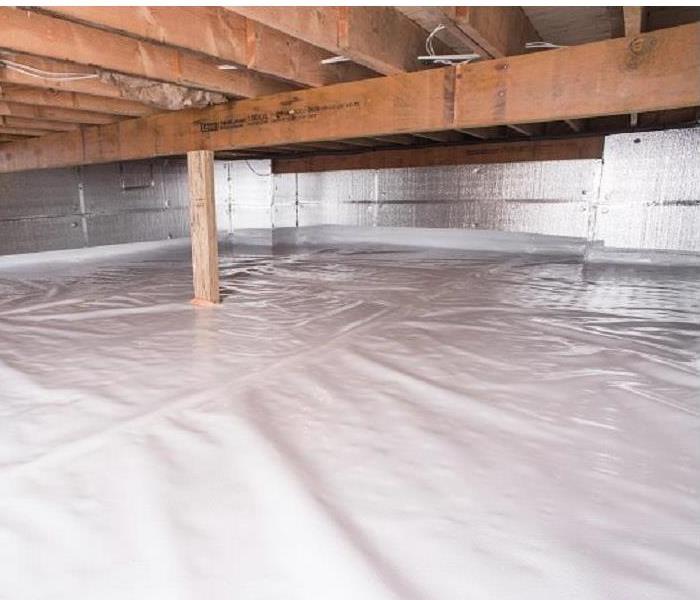 Placing a moisture barrier in your crawlspace can reduce the risk of mold spores growing there, and spreading throughout your Newtown, CT home.
Placing a moisture barrier in your crawlspace can reduce the risk of mold spores growing there, and spreading throughout your Newtown, CT home.
With all of the snow and ice, followed by torrential rains, that we are experiencing in Fairfield County, it has been a very wet winter. These conditions will lead to an increase in mold growth in homes and businesses.
Water that has leaked behind walls or seeped into basements unnoticed are often the common culprits, as is the high humidity that rainstorms bring.
There are some actions that our IICRC trained mold specialists suggest you take to reduce the likelihood of mold growing in your home.
- If you have one of the beautiful old Connecticut homes that has a dirt floor crawlspace, spread a moisture barrier down on the ground. Polyethylene or roofing paper will do the trick. This will help to reduce the moisture entering your crawlspace, and mold spores from entering your home.
- If there are any leaks coming from your roof and you cannot have it repaired until spring, cover it with a tarp to stop any water from entering.
- To stop any water from coming into your basement, grade the ground around your foundation to slope away. This will reduce the amount of water that is standing around your foundation and it's chances of entering your home.
- If you have a home that tends to get wet, be proactive after a rainstorm. Run dehumidifiers, heaters and fans in the vulnerable area if necessary.
- Keep an eye on windows and pipes for condensation, which can be caused by a leak or another source of high humidity in the room.
Mold spores can grow easily and spread fast in wet weather. If you see signs of mold after a flood or water damage this winter, give us a call to come out for an inspection. Catch it before it significantly spreads and the treatment process can be done with minimal impact to your life.
What can you do to avoid mold growth in your home?
11/8/2017 (Permalink)
 Mold in your attic can be caused by insufficient or improperly installed venting as well as a roof leak that has not been repaired.
Mold in your attic can be caused by insufficient or improperly installed venting as well as a roof leak that has not been repaired.
Mold is everywhere in our environment.
It occurs naturally and at normal levels, it is not harmful in your home. However, if there are conditions in your home that are causing abnormal levels of mold spores to be present, professional remediation may be necessary. Sometimes, mold is hidden behind walls, in attics and under carpeting, making it hard to identify. There are some preventative steps that can be taken to reduce the risk of toxic mold in your New Milford home.
- Run air conditioners during the summer and dehumidifiers year round to lower the humidity in the air- under 50% is ideal.
- Have an exhaust fan installed in bathrooms with showers
- Regularly check under sinks for pipes leaking under your cabinets. This is a major cause of the mold jobs we receive. A slow drip over years can cause a big mold problem.
- Opt for hard flooring in basements and bathrooms rather than carpeting, which are an ideal breeding ground for mold.
- Check your attic for signs of mold- make sure that your attic vents are not blocked and functioning properly.
- Take preventative measures to avoid ice dams, which can result in mold growth in a home.
- Repair any leaks immediately and thoroughly clean up any water from the leak.
- Make sure your gutters are properly functioning and that they are not blocked with leaves. This will help reduce the water flowing towards your house and possibly into your basement.
- Similarly, making sure that the landscaping around your house slopes away will reduce the water entering your foundation.
- If you have an old Connecticut home with a crawlspace, there are vapor barriers that can be installed to stop mold spores from entering through those wood floor gaps.
If you suspect you have mold in your home, whether it's because you notice a musty smell, have unexplained illness or see a black substance on your walls, call us at (203) 743-5362 to schedule an inspection with one of our IICRC mold specialists.
What are the symptoms of mold in your Litchfield County home?
9/21/2017 (Permalink)
 The symptoms of mold exposure in your Bethel, CT home are headaches, respiratory problems, skin rashes and fatigue.
The symptoms of mold exposure in your Bethel, CT home are headaches, respiratory problems, skin rashes and fatigue.
Toxic mold in the home is not always the first suspect when a person feels ill. We recently served a customer who had sudden onset asthma as well as a rash and itching on their legs within weeks of moving into a new home. Despite having multiple tests conducted by their physician to discover the cause, mold was never considered. There was no visible mold in the home nor any known defects that would cause mold. After a friend mentioned the possibility of mold in his new home, our customer had their Washington home tested for mold spores.
There are several symptoms that indicate an exposure to mold, including:
Headaches: Mold spores in the air can cause some people to have headaches. In particular, those who suffer migrane headaches are particularly sensitive to stimulants.
Sore throat: When mold spores get lodged in the throat, they can irritate the membranes.
Shortness of breath: Breathing in mold spores can cause respiratory difficulties in some people. They may even develop asthma or may have asthma and not realize that their asthma attacks are being trigged by the mold in their homes.
Runny nose or sinuses: What may feel like a runny nose from a head cold or seasonal allergies could actually be a sign that you are reacting to mold spores.
A skin rash: Topical exposure is not necessary for mold spores to cause a skin rash. Inhaling the spores can cause this reaction by the body.
Feeling tired: Feeling exhausted despite getting adequate sleep is a sign that your body is being run down by something, and it can be mold.
Sometimes there are no telltale signs that there is a mold infestation in your home however if you are inexplicably experiencing any of these symptoms, call SERVPRO of Newtown and Southern Litchfield County (203) 743-5362 for an inspection.
When your family heirlooms and important documents have mold damage in Brookfield, CT
9/15/2017 (Permalink)
 Mold on artwork doesn't mean that it can't be saved. SERVPRO of Newtown & Southern Litchfield County has a special process to kill mold spores.
Mold on artwork doesn't mean that it can't be saved. SERVPRO of Newtown & Southern Litchfield County has a special process to kill mold spores.
On occasion, we are called to a home with mold infestation that has damage that extends to the contents of the home. Upholstered furniture, photo frames, stuffed animals, bedding, important documents and even lampshades can become infested with mold spores. Although some household items may be disposable and not worth cleaning, there is the possibility that your families sentimental and valuable items can be saved.
Our technicians use a specialized process called Gamma Irradiation to treat mold damaged items. This is used for cleaning, disinfecting and decontaminating documents or other consumer goods. In gamma irradiation, high-energy photons are emitted from an isotope source (Colbalt 60) producing ionization(electron disruptions) throughout a product. In living cells, these disruptions result in damage to the DNA and other cellular structures. These photon-induced changes at the molecular level cause death to the organism or render the organism incapable of reproduction. The gamma process does not create residuals or impart radioactivity in processed products.
If you are concerned that the mold remediation process will result in the loss of your favorite heirlooms, give the SERVPRO of Newtown and Southern Litchfield County office a call at (203) 743-5362 for a consultation with one of our IICRC trained mold specialists. We have thirty years of experience in the Connecticut area and can accurately assess your situation.
Take early action to avoid storm damage in Brookfield, CT
9/8/2017 (Permalink)
 Sherman, CT basements often flood during storms. SERVPRO of Newtown and Southern Litchfield County can respond to your emergency quickly.
Sherman, CT basements often flood during storms. SERVPRO of Newtown and Southern Litchfield County can respond to your emergency quickly.
Hurricane season is upon us in Connecticut. Flooding caused by heavy rains and powerful winds can damage your roof and cause trees to fall on your home. After the storm, there can exist safety and health hazards as well, such as contaminated water from flooding and downed power lines. We recommend that you have a plan in place to deal with damage both at your home and business before and after the storm.
Strong winds and heavy rain can cause hazards such as a damaged roof and shattered windows. Board windows and stay away from them during the storm. Trim tree branches around your house and consider removing dead trees that have a greater chance of falling.
Flooding can cause standing water in the basement. Make sure any cracks are sealed and that your sump pump is properly functioning. If you know that your basement floods, remove any possessions or materials that will get wet such as carpeting and cardboard boxes. These make the perfect environment for mold growth that can cause health issues. Floodwater is often contaminated and may not be safe to walk through.
Gas lines can fail - Shut off the main gas line if you smell gas.
Physical hazards include broken glass, exposed nails, and other sharp objects on the property. Take caution when leaving your home after the storm and never enter an area that may not be safe.
Power lines are often down after high winds and storms. Be sure to survey your area fully prior to allowing children and pets outside.
Contact SERVPRO of Newtown and Southern Litchfield County at (203) 743-5362 if you have storm damage. We are Fairfield County experts at water restoration, mold remediation and biohazardous clean up.
Not all homeowner's insurance policies cover mold in Litchfield County
8/7/2017 (Permalink)
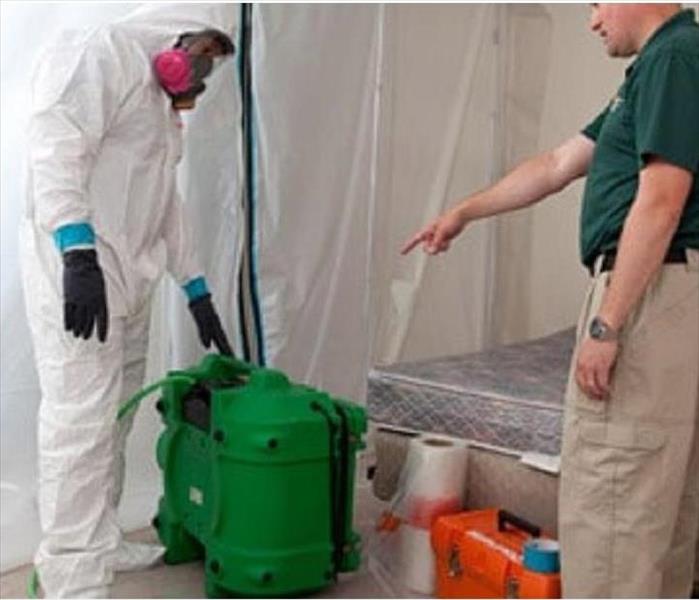 Not every Roxbury area home we inspect requires professional mold remediation however many do. Check your insurance policy to see if it covers mold.
Not every Roxbury area home we inspect requires professional mold remediation however many do. Check your insurance policy to see if it covers mold.
We are called to New Milford area homes on a weekly basis to inspect mold. With all of the attention on black mold and it's potential to be toxic to the health, many homeowner's don't want to take a chance when they spot mold. Luckily, not every home that we inspect requires professional remediation from the SERVPRO of Newtown and Southern Litchfield County team. We are often able to recommend a safe method in which homeowner's can reduce their mold risk or treat it themselves.
There are also the cases in which there is a mold infestation in the home that requires our services. It can be surprising to some homeowners to discover that their insurance policy does not cover mold.
Call your insurance agent if the language of the policy is confusing and you are unsure. Some policies contain clauses that exclude mold. Some will cover mold removal only under certain circumstances. Typically, if your policy does not include mold remediation it can be added onto the policy. It's a smart preventative measure that can save you thousands in the future.
If you see signs of mold in your Fairfield County home, call SERVPRO of Newtown and Southern Litchfield County at (203) 743-5362. Our IICRC certified mold technicians will come out and give you an honest assessment of the situation.
The Truth About Mold in Fairfield County, Connecticut
5/20/2017 (Permalink)
 Not all levels of mold are toxic. If you discover mold in your Sherman, CT home,call SERVPRO of Newtown & Southern Litchfield County at (203) 743-5362
Not all levels of mold are toxic. If you discover mold in your Sherman, CT home,call SERVPRO of Newtown & Southern Litchfield County at (203) 743-5362
You might notice that we do not advertise that we perform mold removal. Rather, we are experts at mold remediation. Other restoration businesses advertise “mold removal”. They may even guarantee to remove all mold, which is a fallacy.
The truth is that microscopic mold spores naturally occur almost everywhere, both outdoors and indoors. This makes it impossible to remove every single mold spore from the air. In mold remediation, our aim is to reduce the mold spore count back to its natural level. Consider the following facts about mold.
Mold spores are microscopic and present naturally both indoors and out. They may enter your home through windows, doors, or AC/heating systems or even enter on you or your pet.
Moisture is essential to the existence of mold spores. When exposed to water, spores quickly form into colonies. These colonies may produce allergens and irritants.
Prior to beginning any mold remediation, the source of the water or moisture must be corrected. Otherwise, the mold may return.
The strong, musty odor that mold often produces can lead you to problem areas.
Standing water isn't necessary for mold to grow. Even higher-than-normal indoor humidity can support mold growth. Keep indoor humidity below 45 percent.
If you have signs of mold, SERVPRO of Newtown and Southern Litchfield County can inspect and assess your property. We have the specialized training, equipment, and expertise to remediate your mold infestation and bring your mold spore count to safe, natural levels.
Not all levels of mold are going to create toxic conditions in your New Fairfield area home. If you see or smell signs of mold, give us a call for an inspection at (203) 743-5362.
Mold in Your Connecticut HVAC System
5/2/2017 (Permalink)
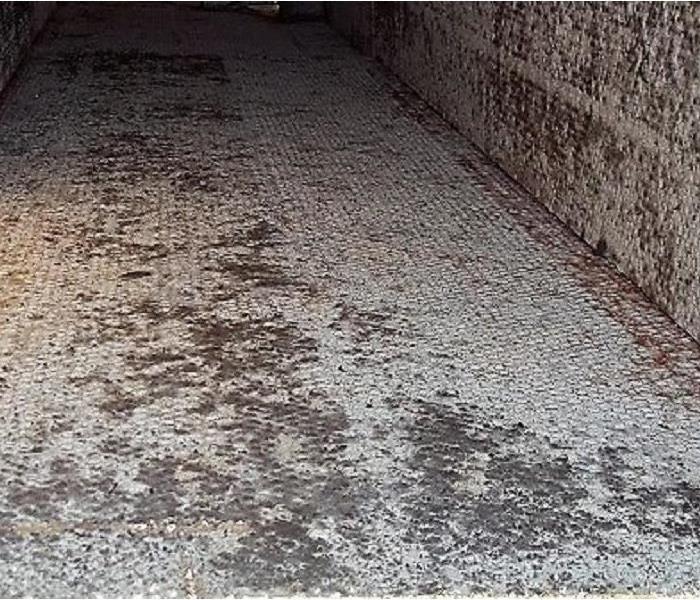 Mold in your New Fairfield, CT ducts can spread throughout your home, causing health problems.
Mold in your New Fairfield, CT ducts can spread throughout your home, causing health problems.
An area of the home in which mold can grow without notice is inside of the HVAC system. The damp and dark conditions of duct work, AC evaporator coils, and drip pans are the perfect environments for mold growth. The outside particles that are pushed through the ducts contain organic particles such as pollen, which serve as a food source for the mold. Hidden from view, mold can grow unseen and unnoticed, allowing the spores to be blown throughout your home and potentially cause health problems to your family.
In addition to visibly spotting mold, signs that mold may be in your HVAC unit can be a musty or mildew smell in your Fairfield County home as well as family members experiencing unexplained respiratory illness, headaches, and rashes.
A few simple steps can help keep your HVAC system clear of mold spores.
1. Scheduling a yearly cleaning of your HVAC system with SERVPRO of Newtown and Southern Litchfield County to keep it free of dirt, debris and other organic materials will reduce the risk of mold growth. It will also remove other allergens that can affect the health of your family.
2. Monitor the moisture levels in your HVAC unit to make sure there is no standing water and have a service company come and check for a possible leak if you see excessive condensation.
3. Changing your HVAC filter once every three months to cut down on mold spores and other allergens being spread throughout your New Milford, CT home.
If you suspect that there may be mold in your HVAC system, call us at (203) 743-5362. We will come out and inspect your system for mold spores. If mold is found, SERVPRO of Newtown and Southern Litchfield County has the training, equipment, and expertise to remediate your mold infestation.
Keeping mold from growing in your Fairfield County basement
3/11/2017 (Permalink)
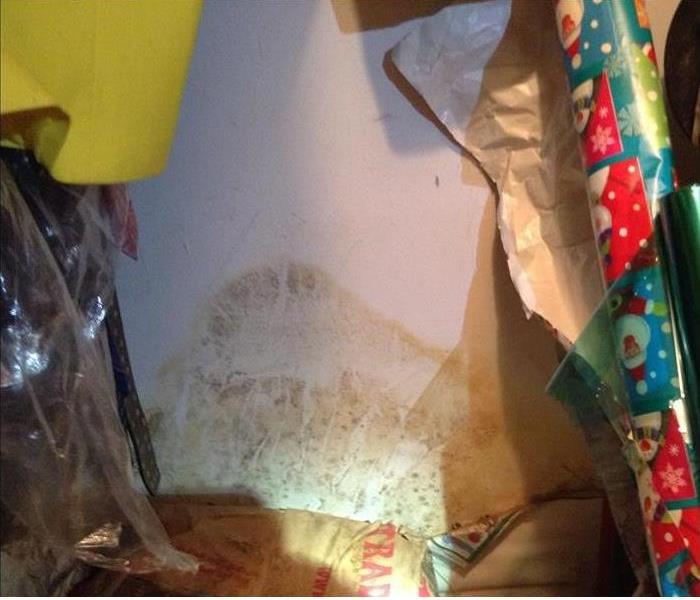 Hidden behind the clutter, black mold was able to grow on the walls in the basement of this home.
Hidden behind the clutter, black mold was able to grow on the walls in the basement of this home.
The most common area in a home for mold to grow is in the basement. The combination of high humidity levels, condensation, water seepage and floods as well as clutter in basements create the ideal conditions for mold growth. There are some actions you can take to prevent toxic mold from growing in your Bethel, CT basement.
- Keep humidity levels down: You can check humidity levels using a hydrometer. Most experts agree that levels under 60% humidity are safe against mold growth, with 30% being optimal. Check the levels seasonally, as humidity levels often rise in warmer weather. If your levels are above 60%, using a dehumidifier can help reduce moisture in the air. A 30 pint dehumidifier is sufficient for the average 1500 square foot basement here in Brookfield, CT. Having a floor drain works best however if your basement lacks one, consider a dehumidifier that is capable of draining the water vertically into a sink.
- Stop water from seeping in and flooding: Mold needs moisture to grow. Even a small water leak is enough to allow mold to grow. If you notice water puddling up against the exterior of your house, you can slope the land away from your home in order to redirect it. Make sure that your gutters are clear and downspouts directed away from the house. You can also have your Newtown basement sealed to keep water out.
- Organize and declutter: The basement is the place that many people store their unused items and we all know that it can fill up quickly. Along with the lack of ventilation caused by an overcrowded environment, porous materials such as clothing, carpeting, books and cardboard boxes can dampen easily and be a perfect breeding ground for mold spores. Additionally, if the area is not visited often, mold growth can go unnoticed for too long. Discard items that are no longer needed and store others in plastic bins rather than cardboard boxes.
A minor mold problem can quickly become a major infestation if left untreated. We can start the remediation process immediately after you contact us. If you notice mold in your Sherman basement, call the SERVPRO of Newtown and Southern Litchfield County office at (203) 743-5362.
Mold in your Roxbury, CT home - the causes and solutions
2/2/2017 (Permalink)
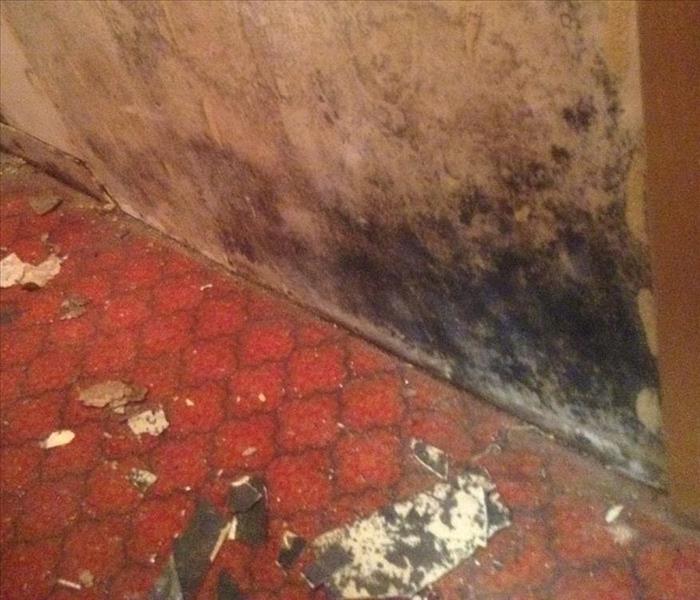 A damp, carpeted basement in Ridgefield, CT was the ideal environment for mold to grow
A damp, carpeted basement in Ridgefield, CT was the ideal environment for mold to grow
There has been a lot of press on mold in homes and the potential health hazards of black mold lately. At SERVPRO of Newtown & Southern Litchfield County, we talk with many homeowners who are concerned when they discover mold in their home.
In order to grow, mold requires certain conditions to be met. Mold spores need to be present and have a food source (examples would be cotton, sheetrock, plywood, etc.). In addition, mold requires darkness, oxygen and warm temperatures. However, these are typical conditions in most homes. The factor that most determines whether mold will grow in your home is moisture.
Some of the most common causes of residential mold damage are:
1. Leaky Pipes - A slow leak might not be obvious to a homeowner but over time can create an environment that is ideal for mold growth. We have responded to a number of jobs in Fairfield County in which a plumber has discovered mold behind the kitchen cabinets due to a leaking pipe. In these cases, the kitchen cabinetry as well as walls and flooring often requires removal.
The fix: Periodically check pipes, walls and cabinetry for any signs of leaking.
2. Attic Mold – In order to keep moisture levels low in an attic, it must be ventilated properly. A well-ventilated attic will allow warm air to escape through the peak of the roof via the ridge and soffit vents. Another reason for moisture in an attic can be a roof leak.
The fix: Have your ridge and soffit vents checked for blockages and inspect your roof and attic for leaks.
3. Basement Mold – Due to low sunlight, condensation, high humidity, flooding and leaks, the basement is a common location for mold growth. In addition, people spend little time in their basement and are less likely to spot it early on.
The fix: If there is flooding, have your basement waterproofed. Keep humidity levels down with a dehumidifier. Repair any leaky pipes. If there is water at your house's foundation, it may be necessary for ditches and drains to be built to protect your New Fairfield home.
The good news is, not all mold requires professional remediation. If you spot mold in your Bethel home, give us a call at (203) 743-5362. Our owner and mold specialist, Ted White, is IICRC certified and has over 20 years of experience inspecting mold and will give you an honest assessment of whether mold remediation is required.
Sandy Hook Residents: Follow These Mold Safety Tips If You Suspect Mold
10/15/2016 (Permalink)
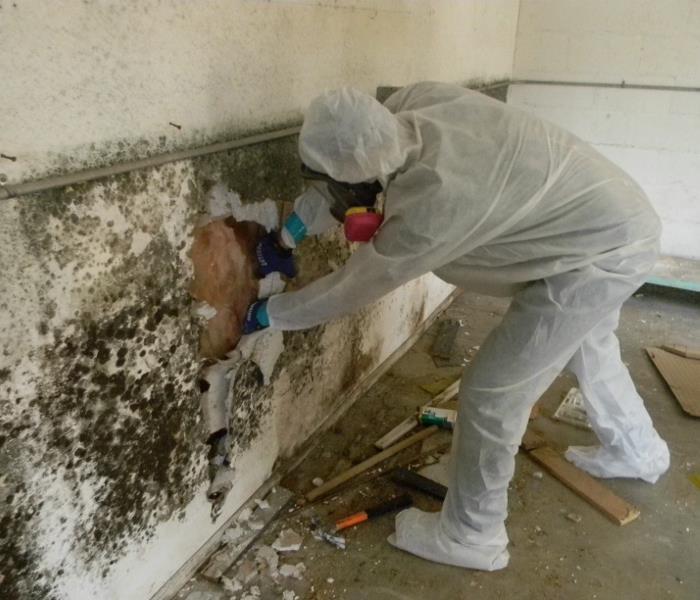 Be careful! Without proper training, you could be spreading mold throughout your home.
Be careful! Without proper training, you could be spreading mold throughout your home.
If you see visible mold, do not disturb it. You can inadvertently spread the mold infestation throughout your home. When mold is disturbed, the mold can release microscopic mold spores which become airborne and can circulate inside your home.
What to Do:
- Stay out of affected areas.
- Turn off the HVAC system and fans.
- Contact SERVPRO of Newtown and Southern Litchfield County for mold remediation services.
What Not to Do:
- Don’t touch or disturb the mold.
- Don’t blow air across any surfaces with visible or suspected mold growth.
- Don’t attempt to dry the area yourself.
- Don’t spray bleach or other disinfectants on the mold.
About Our Mold Remediation Services
SERVPRO of Newtown and Southern Litchfield County specializes in mold cleanup and restoration, in fact, it’s a cornerstone of our business. Our crews are highly trained restoration professionals that use specialized equipment and techniques to properly remediate your mold problem quickly and safely.
If You See Signs of Mold, Call Us Today – (203) 743-5362
Black Mold in Connecticut - not a DIY project
8/21/2016 (Permalink)
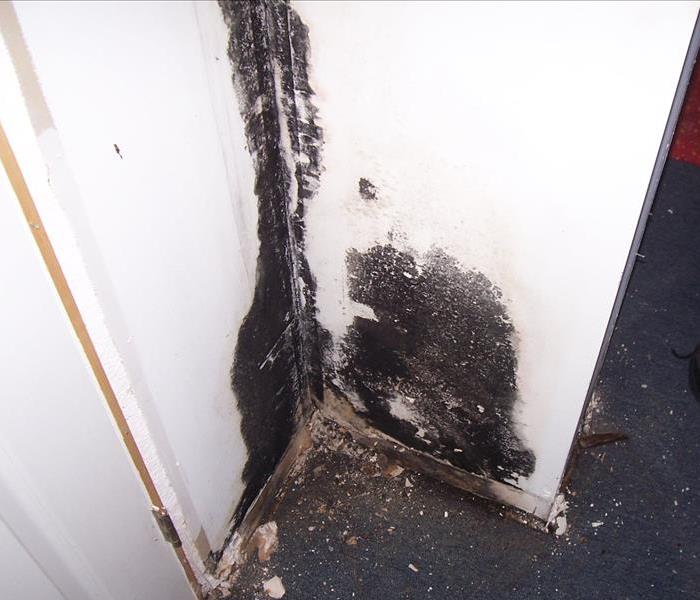 Black Mold isn't always this obvious!
Black Mold isn't always this obvious!
With all of the attention and media coverage about household mold, and it's associated health risks, SERVPRO of Newtown and Southern Litchfield County often fields phone calls from concerned homeowners who have discovered mold in their home.
Unfortunately, the internet is full of misinformation on what is effective and safe mold removal - such as the misconception that bleach kills mold (it does not). While there are some cases where a small area of mold can be effectively cleaned by a homeowner themselves, we recommend having a SERVPRO IICRC trained professional come and inspect your home.
Mold spores are microscopic, float along in the air, and may enter your home through windows, doors, or AC/heating systems or even hitch a ride indoors on your clothing or a pet. A homeowner may have cleaned all visible evidence of mold from a hard surface yet not know the level of mold spores in the air and how it is affecting their home and their health.
Give us a call at (203) 743-5362 if you spot mold in your Brookfield, CT home. Ted White, our owner and mold specialist, will come out to your house, survey the situation and give you an honest opinion of what action needs to be taken.
Our Highly Trained Restoration Specialists can restore your Newtown Home
6/3/2016 (Permalink)
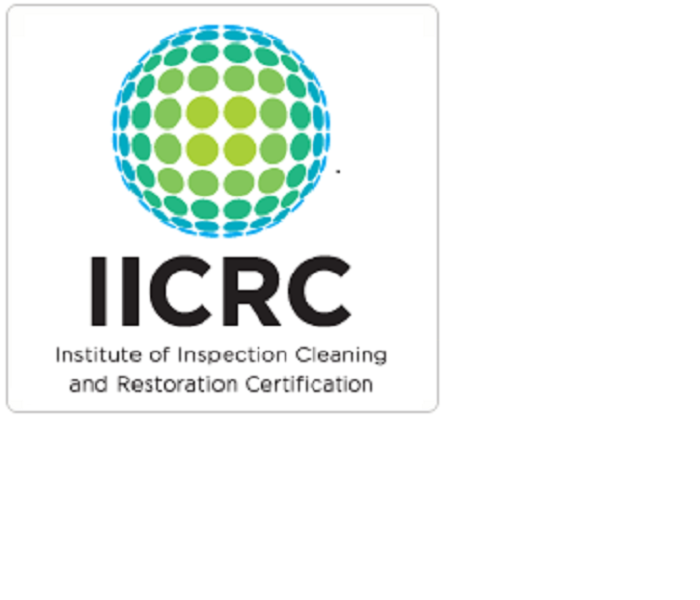 We are an IICRC Certified Firm
We are an IICRC Certified Firm
SERVPRO of Newtown and Southern Litchfield County is an IICRC firm. The Institute of Inspection, Cleaning and Restoration Certification (IICRC) creates the standards for the restoration industry and provides training and certification to restoration companies. IICRC Certified Firms have the right to display the IICRC Certified Logo.
IICRC Certified Firms must
• Present accurate information to consumers and conduct business with honesty and integrity.
• Require a technician on all jobs who has been formally trained and passed all required tests.
• Require a continuing education program to keep technicians up-to-date on the latest changes in the industry.
• Maintain liability insurance to protect all parties in the event of an accident.
• Maintain a written complaint policy and agree to Better Business Bureau or similar arbitration to resolve disputes, and accept the conclusions and recommendations of arbitration.
The IICRC Develops The Standards For The Restoration Industry
The IICRC has been the driving force in establishing the main industry standards and reference guides for professional carpet cleaning, water damage restoration and mold remediation. These IICRC standards take years to develop and require the coordination of experts in the field: manufacturers, industry organizations, insurance professionals, training schools, contractors, and public health professionals.
Every five years, the standards are reviewed and updated. The water damage restoration field changes rapidly with advancements in technology and science, and therefore the standards must evolve to keep pace.
About SERVPRO of Newtown and Southern Litchfield County
SERVPRO of Newtown and Southern Litchfield County specializes in the cleanup and restoration of residential and commercial property after a fire, smoke or water damage event. Our staff is highly trained in property damage restoration and we are an IICRC Certified Firm. We believe in continuous training: from initial and ongoing training at SERVPRO’s corporate training facility to regular IICRC-industry certification, rest assured our staff is equipped with the knowledge to restore your property.
Does your Newtown home have a mold problem?
5/14/2016 (Permalink)
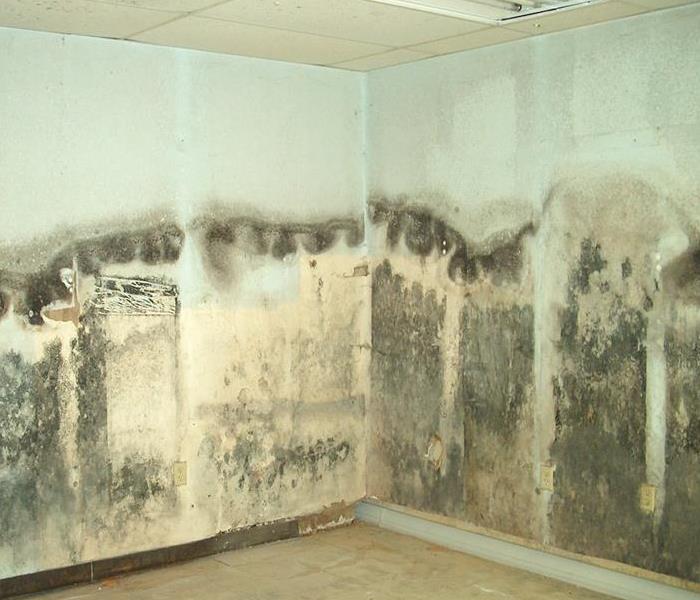 In Litchfield County, mold can spread through a home in as little as 48 hours.
In Litchfield County, mold can spread through a home in as little as 48 hours.
Microscopic mold spores naturally occur almost everywhere, both outdoors and indoors. This makes it impossible to remove all mold from a home or business. Therefore, mold remediation reduces the mold spore count back to its natural or baseline level. Some restoration businesses advertise “mold removal” and even guarantee to remove all mold, which is a fallacy. Consider the following mold facts:
Mold is present almost everywhere, indoors and outdoors.
Mold spores are microscopic and float along in the air and may enter your home through windows, doors, or AC/heating systems or even hitch a ride indoors on your clothing or a pet.
Mold spores thrive on moisture. Mold spores can quickly grow into colonies when exposed to water. These colonies may produce allergens and irritants.
Before mold remediation can begin, any sources of water or moisture must be addressed. Otherwise, the mold may return.
Mold often produces a strong, musty odor and can lead you to possible mold problem areas.
Even higher-than-normal indoor humidity can support mold growth. Keep indoor humidity below 45 percent.
If your home or business has a mold problem, we can inspect and assess your property and use our specialized training, equipment, and expertise to remediate your mold infestation.
If You See Signs of Mold, Call Us Today (203) 743-5362





 24/7 Emergency Service
24/7 Emergency Service
